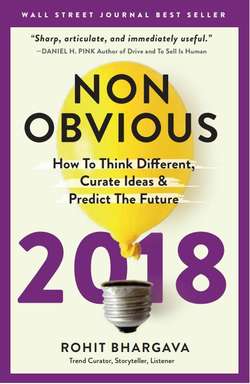Читать книгу Non-Obvious 2018 Edition - Рохит Бхаргава - Страница 26
На сайте Литреса книга снята с продажи.
The Curator’s Mindset:
Learning the 5 Essential Habits
of Trend Curators
Оглавление_
“You never learn anything by listening to yourself speak.”
SIR RICHARD BRANSON, Entrepreneur and Founder of the Virgin Group
_
Across decades of research with grade school students, interviewing professional athletes and studying business leaders, renowned Stanford psychology professor Carol Dweck has developed an elegant way to describe why some people manage to exceed their potential while others peak early or never achieve that same success.1
According to Dweck, it all depends on your mindset.
People with fixed mindsets believe that their skills and abilities are set. They see themselves as either being good at something or not good at something, and therefore tend to focus their efforts on tasks and in careers where they feel they have a natural ability.
People with growth mindsets believe that success and achievement are the result of hard work and determination. They see their own (and others’) true potential as something to be defined through effort. As a result, they thrive on challenges and often have a passion for learning.
When it came to setbacks, people with a growth mindset are more likely to treat failure “like a parking ticket instead of a car wreck.”2 They’re more resilient, have more self-confidence, are less focused on getting revenge for any perceived wrong, and tend to be happier.
Despite the many benefits of adopting a growth mindset, the sad reality is that as soon as children become able to evaluate themselves, some of them become afraid of challenges and failure. They become afraid of not being smart. This is a tragedy, because it’s a limitation that they will continue to impose upon themselves into adulthood, sometimes without realizing it.
I have studied thousands of people . . . and it’s breathtaking how many reject an opportunity to learn.
— Carol Dweck (from Mindset)
The first and most important key to becoming a better collector of ideas and thinking more innovatively is the deceptively simple decision not to limit yourself.
What if you were capable of more than just that narrowly defined list of things you believe you are naturally good at? Learning to curate ideas into trends, like playing an instrument or being more observant, is a skill that’s within your grasp to learn and practice—but only if you venture outside of your mental comfort zone and adopt a growth mindset.
Does this mean anyone can transform themselves into a professional flamenco guitarist or a full-time trend forecaster with enough practice? Not necessarily. Aptitude and natural talent still play an important part in succeeding at anything on a professional level.
Yet the past decade of my work with thousands of executives and students at all levels of their careers has proved to me that the skills required for trend curation can be learned and practiced, just as the growth mindset can be taught and embraced. When you learn these skills and combine them with the right mindset, they can inform your own view of the world and power your own future success.
After understanding your mindset, the next step on your path to predicting the future is learning five core habits. To start learning them, let me share a story of the most famous art collector most people had never heard of—until he passed away a few years ago.
